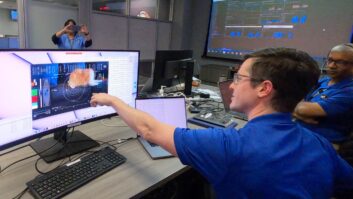The US government finds itself stuck in a quandary over whether or not to allow consumers to use unlicensed wireless devices in the White Spaces spectrum that currently ensures two TV stations’ signals don’t interfere with each other, writes Ken Kerschbaumer.
On one hand are those who are unsure that unlicensed devices can be used without causing widespread spectrum anarchy. On the other hand there is a coalition made up of Microsoft, Google, Dell, Hewlett-Packard, Intel and Philips that say they can meet the challenge. Last week they gave Federal Communications Commission officials a prototype device, built by Microsoft, that will undergo months of testing. If the device passes muster, the coalition said, it could have versions in stores by early 2009.
Jonathan Adelstein, FCC commissioner said the new devices could take the WiFi phenomenon to another level. But others aren’t so sure, in particular the wireless audio industry and over-the-air broadcasters who are concerned the new devices will make it impossible to use wireless microphones and will endanger over-the-air-DTV reception.
“As you go out into the field and broadcast an event like on-the-spot news coverage suddenly someone nearby fires up a wireless laptop or WiFi device and your mics go out,” said Dave Donovan, president of Maxium Services Television, an association dedicated to fighting for spectrum integrity. “You have no idea where the interference is coming from, and there is no way to solve that problem in realtime.”
After seemingly battling White Spaces legislation without a similar weapon, relief came from Congressman Bobby Rush, a Democrat from Illinois, who introduced a bill to protect wireless microphone users. It acknowledges that introduction of such devices “without adequate safeguards” would interfere with “other existing television band devices already operating on the unassigned, non-licensed television channels.” It also only permits portable (mobile) unlicensed device use of the “white spaces” after the fixed devices operate for three years without causing interference
Sandy LaMantia, President and CEO of Shure Inc, praised the bill and Rush and it’s more than likely that the bill was the result of hard lobbying by Shure, which is itself located in Illinois.
“I would expect legislators from every major metropolitan area to be very interested in this bill based on their constituent reliance on wireless microphone technology,” LaMantia said.
On the other side is Rep. Jay Inslee, a Democrat from Washington State who plans to introduce his own white space bill “in the coming weeks.”
“For too long, we’ve let this high-potential spectrum go to waste,” said Inslee. “We now have the technology to put it to good use and leave current users unaffected.”
Donovan said that is patently false, particularly in large markets “There are entities out there such as Intel that say that in New York City there are up to 48MHz of available spectrum but our analysis indicates that’s not quite right,” he said. “You may get a little sliver here and there but there certainly is not enough to support millions of devices in a metropolitan area and certainly not if you want to do live events.”







